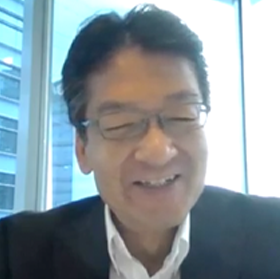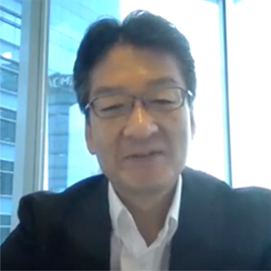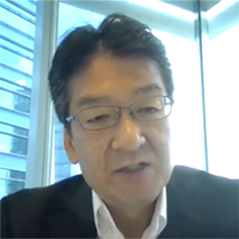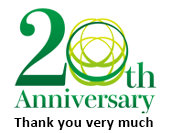Key person interview

I would like to express my utmost respect for achieving profitability.
Yoshiyuki Shibusawa
Question 1. Please tell us about your relationship with SymBio Pharmaceuticals.
JAFCO Group, whose business is to invest in venture companies, first contacted SymBio Pharmaceuticals back in 2005, shortly after the company was founded. At that time, even in Japan, many bio-ventures had already started up, and some of them were listed on the stock exchange. At our company, we have positioned life science investment as a major investment area for venture investment, and have set up a specialized investment team that includes people from pharmaceutical companies, and have been working hard to discover promising ventures.
Through such research, I came to know about SymBio Pharmaceuticals, and as a result, one year after its founding, I made a fairly large investment of 1 billion yen, which was a one-time investment at that time.
When we first met, there was a lot of anticipation and tension about the career of Harvard University graduate Yoshida, former president of Amgen Japan, a bio-venture company with a long history in the United States.
When I actually met him, my first impression was, in a sense, that he had global management capabilities and business conception capabilities, just as I had expected. Also, his high aspirations for the business and his solid philosophy left a strong impression on me.
At the same time, there is still a big gap between the business concept of SymBio Pharmaceuticals and investors like us regarding the nature of the biotech business and its risks. As President Yoshida, I feel that you have worked very hard to correctly communicate your company's growth scenario to investors, gain their empathy, and obtain their consent.
Looking back now, I think that it was a time when we were working hard together with entrepreneurs to commercialize the life science field, as the investors did not have enough experience of success.
Question 2. Please tell us about the decisive factor for the investment and the future image you envisioned.
There are three major decisions regarding investment. One is marketability. The second is the business model, which could be called the core of the company, and the third is the management team. We will start our business in cancer and blood, which are serious, Underserved Therapeutic Areas in large markets, in other words, rare diseases. The target is a drug that has already been put to practical use overseas and has saved the precious lives of many patients, but has not even been developed in Japan. By doing so, we aim to reduce early development risks and obtain early approval and a high market share. Furthermore, after approval, we will proceed with so-called horizontal development by expanding indications. By building our own value chain from in-house development to in-house sales, we maintain high development quality and contact points with the medical field, and work to develop our business together by directly linking to the information on the medicines that patients really need. .
The expertise that underpins this business model, the world-class professional team with the so-called discerning ability, and the business concept of SymBio Pharmaceuticals made us believe that a full-fledged Japanese specialty pharmaceutical company was born. I felt that this kind of era had come to Japan as well.

Question 3. From the perspective of a venture investor, what are your thoughts on the difficulty of bioventures in obtaining new drug approval and engaging in sales and distribution?
The so-called biotechnology business is characterized by the fact that once it is approved as a drug, there is demand worldwide, and it is possible to calculate and predict it quantitatively to a certain extent based on data such as the number of patients and drug prices. On the other hand, the development process requires a large amount of funds and is accompanied by a large deficit in the early stages. This development risk until commercialization, known as the "valley of death," is said to be generally higher than other businesses.
I believe that the achievement of SymBio Pharmaceuticals in achieving profitability through new drug approval and product sales is a very big milestone. Looking back over the more than 15 years since our founding to the present day, we have seen many waves, including the global financial crisis known as the Lehman Shock. In fact, when I was most deeply involved in SymBio Pharmaceuticals, the funding environment was the toughest in the world. It was a situation of scramble for funds.
JAFCO also collects funds from investors to form a fund, so we were in a similar situation as investors were trying to avoid risk.
In the history of SymBio Pharmaceuticals, I think it can be said that there have been battles not only with the development risks unique to the biotechnology business, but also with the fundraising triggered by the financial crisis. If fundraising is sluggish, time shifts. If the time shifts, the business plan will need to be revised. It was really tough here, honestly. With the approval of other investors, we also made additional investments a total of three times, and I believe we have overcome this period together with everyone at SymBio Pharmaceuticals. To be honest, I think that the lag in the time axis until we became profitable was probably the biggest challenge in our history.
Question 4. How do you feel about the differences and superiority between SymBio Pharmaceuticals and other bio-ventures?
I think that a big business needs to have a cause for society, which is why the business exists. At the same time, flexible adaptability and the ability to evolve in line with the changing times are also required. And it is essential to have an axis that will not be shaken by immediate events. At SymBio Pharmaceuticals, I strongly feel this unwavering philosophy and axis that has been consistent since our founding.
In terms of how to proceed with the business, there are also approaches such as trying for the time being or starting with what you can do. However, there is also the approach of establishing a firm philosophy, envisioning a blueprint, working backwards from the future, and strategically promoting the business. Ultimately, history will prove which side will be able to create a great SymBio. I feel
Question 5. Please tell us about your achievement of profitability in 2021 and your second founding.
I would like to express my utmost respect to President Yoshida, all officers and employees involved in SymBio Pharmaceuticals, as well as all stakeholders and shareholders, for achieving profitability this time. At the same time, I would like to send my heartfelt support to SymBio Pharmaceuticals' determination to "start a second business."
Question 6. How do you perceive the significance of having your own sales and distribution system?

When we reexamine the business model of SymBio Pharmaceuticals, I think that in-house development and in-house sales will be one of its characteristics. I remember that both myself and I thought a lot about which is the most appropriate business model, even when we invested in it.
I think there are both correct answers, but we believe that we can create a consistent business structure by building this series of value chains in-house, from in-licensing of development products to development, approval, and sales. At the same time, you can directly absorb the voices of medical sites and patients. It will be organically fed back to product development and examination of in-licensed products. At that time, I came to the conclusion that this series of mechanisms was one of SymBio Pharmaceuticals' strengths, and invested in it.
In fact, I have discussed this topic with President Yoshida several times, and what left a strong impression on me was the idea of establishing a new type of bio-venture in Underserved Therapeutic Areas The reason for this was the existence of Underserved Therapeutic Areas, which was heard from the medical field. It is very impressive to me that the starting point of the business was to help patients who were really in trouble, rather than simply talking about business models and high profitability. This is a big reason why we decided to walk together.
The professionalism as a manager and, in a word, a noble philosophy are very well balanced. increase.
Question 7. What is particularly impressive about President Yoshida's personality and SymBio Pharmaceuticals?
Bio-ventures are life sciences, so in addition to academic expertise, they also need marketing skills that accurately grasp the needs of society. On the other hand, negotiating with mega-pharmas and companies that have seeds for introduction requires intense negotiations that are no different from M&A. It is truly an investment banker, and the ability as a financial player is also called into question.
Therefore, in general, such a bio-venture is a business related to human life, so it is required to have a noble philosophy and discipline, but in the actual execution As I just mentioned, mixed martial arts with multiple professional qualities is what I felt most strongly when I met President Yoshida and SymBio Pharmaceuticals. Moreover, it was in the harsh environment of the financial contraction after the Lehman shock.
Therefore, even in my venture capital life, there was a tremendous amount of learning during that moment. Therefore, I can empathize deeply with everyone at SymBio Pharmaceuticals, including after the listing, with regard to the toughness of the path they have taken to achieve profitability this time, and the sense of accomplishment they have achieved.
Question 8. Please say something to our shareholders and patients.
We, myself, strongly agree with SymBio Pharmaceuticals' ambition of "Symbiosis" of working together with patients, and the joy of shared drug discovery. That's why I think it should become a great business. For our shareholders, there will be many twists and turns, both in the past and in the future. I would like to see support from a medium- to long-term perspective, just like we did.
Question 9. As a venture capitalist, please give us a message as SymBio Pharmaceuticals goes global.
I moved my base to Singapore in 2012 and have been focusing on venture capital investments in the Asian region for nine years. As a venture capitalist, I spent 20 years in Japan and 10 years in Asia during my 30-year career. With that in mind, I now think more deeply than ever before about how Japan should be viewed in the world.
Compared to other industries, there is no doubt that the biotech field has markets all over the world. Of course, when the US market is the largest, these characteristics stand out even more than other businesses. Moreover, at the same time as requiring a large amount of funds, once a useful new drug is approved and put on the market, extremely high profitability can be expected, and there is a solid demand for it. The bio-life science business is a defensive business (less susceptible to economic fluctuations), and even in the venture capital industry, 10% or more of the total will continue to be an investment area regardless of whether the economic environment is good or bad. This is because it has characteristics that are slightly different from those of other industries.
With that in mind, when thinking about future global expansion, unlike traditional, typical Japanese companies, which simply separate Japan and overseas, SymBio Pharmaceuticals was originally created with a global vision in mind from the beginning, so I don't think it's a stereotypical company anymore, including the members of the company. Are the roots different? I think this is the strength of SymBio Pharmaceuticals when it comes to globalization.
Another thing that I think is very important when looking at global expansion is empathy for the business. Transcending region, nationality, values, and such things, whether the people who gather at the farm can do their best towards the same purpose, cause, and mission. The most important point when professionals come together and work toward a single goal is the purpose of empathy. I think this is meaningful, interesting, and a job worth spending one page of your life on, so I think that's what professionals gather at that farm.
Our firm, JAFCO Group, is currently operating in three divisions: the United States, Asia, and Japan. I think that what is necessary at such times is this “purpose of mutual sympathy”.
